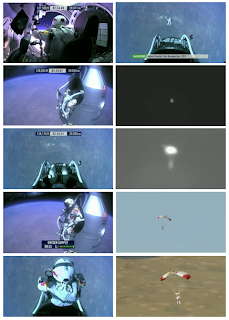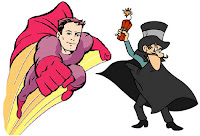Fact-Checking; or, The Professor’s Plight
These responses kind of remind me of all the so-called “fact-checking” that happens following each of the debates between the major parties’ presidential and vice-presidential candidates. Some of that effort is legitimately aimed at seeking corroboration (or the lack thereof) to support or challenge statements made during the debates. But a some of it -- perhaps a lot of it -- is really just spin, that is, a rhetorically-savvy way to persuade others to read a particular, desired message or intent into what was said.
Speaking of fact-checking, there was a moment in the Two Plus Two interview with Lederer in which he instantly inspired pretty much everyone listening to engage in such. I’m talking about that moment when the “Professor” professes a kind of ignorance that Full Tilt Poker continued to deliver the “your funds are safe and secure” message to customers well after the point when it was obvious that was not the case. (I’ve written about this a little before, but forgive me a quick look back at it in the present context.)
To review, Lederer was asked during the 2+2 interview about Full Tilt Poker’s continuing to tell customers that their funds were safe even after Black Friday. Lederer responded by saying he did not believe the words “safe and secure” were still being used in any of FTP’s communications “after April 20 [2011].” And if they were, “it happened without me knowing about it.”
To me that was one of the more blatant bits of culpability dodging Lederer exhibited in either interview.
For one, as just about everyone listening to the podcast knew immediately, the statement was obviously inaccurate. We all remembered how assurances to players about the return of their funds continued to appear well after April 20, 2011 via emails and forum posts by FTPDoug (Shyam Markus). Some of us also recalled the amended civil complaint, filed on September 20, 2011, which catalogued several post-April instances of the “funds are safe and secure” message being repeated.
I included a reference to this point in a post earlier this month. There I noted how the FTP website continued to display the message until after the amended civil complaint appeared that “funds are safe and secure.” I also referred to a post I wrote on 9/22/11 called “Talk About Red Pros (More on the DOJ vs. Full Tilt Poker)” in which I included a screen shot of the front page of the FTP site, taken that day, showing the statement still appeared.
But you don’t have to believe that. Or rather, if you want to check my facts, just take a look at the amended complaint where the DOJ makes the same assertion. “As of September 19, 2011,” they write, “Full Tilt Poker’s website stated that players’ funds were ‘safe and secure.’”
Which means not only is the statement inaccurate, it also sounds highly insincere.
That’s because when Lederer says he doesn’t believe FTP was saying anything about funds being “safe and secure” after April 20, he’s suggesting both that he had no idea what was posted on the fulltiltpoker.com site between April-September 2011 and that he wasn’t aware of the long list of examples of the assurance being repeated that appears in the amended civil complaint.
The latter suggestion is especially odd to consider, given how Lederer himself is being directly charged with funneling player funds into his own accounts in that very complaint. Indeed, it is at the end of the long section titled “FULL TILT POKER’S AND THE FTP INSIDER DEFENDANTS’ THEFT OF PLAYER FUNDS” that we find the quote about FTP’s website continuing to maintain on 9/19/11 that player funds were “safe and secure.” In other words, it is beyond disingenuous for Lederer to have us believe he never read the civil complaint in which he himself is named.
So he’s factually incorrect. And he’s not credible, either, when he explains why his facts might be wrong.
I call this one of the more blatant instances from the interviews of Lederer ducking under a hood of supposed ignorance in order to evade blame, but it isn’t the most significant example of him doing so. And really, in the larger scheme, while Full Tilt Poker’s misrepresentation of the situation to customers during 2011 is certainly blameworthy, worse crimes were committed in order to create that situation.
Again, I think of the debates and the so-called “fact-checking” that follows them. In some cases, those engaged in the effort to confirm or dispute candidates’ statements are being moved by a genuinely estimable intention -- i.e., to seek truth, and to hold those seeking our votes accountable for the words they say. Others are motivated by the less noble purpose of political spin, their goal being to recast objective evidence (the words that were spoken) as supporting this or that self-serving narrative.
While I suppose some of those engaged at present in fact-checking Lederer are just piling on or following the mob, I think most are doing so with good, constructive intentions.
Even so, at the risk of sounding overly cynical, in the end I’m afraid what we’re all mostly engaging in is a big, distracting game of trivial pursuit. The same goes for the debate fact-checkers. Most of the details of their findings will be forgotten come Election Day, and all of them will essentially buried thereafter, only to be dug up later by academics and other obscurists.
It’s a curious text, no doubt, the two-act absurdist play in which Lederer starred in those interviews with PokerNews and Two Plus Two. Call it The Professor’s Plight, another drama helping comprise that fascinating and varied genre of theatrical works that have been produced over the last decade by online poker. About which someone will someday be writing a dissertation, I am sure.
Labels: *the rumble, Black Friday, Daniel Negreanu, Diamond Flush, Full Tilt Poker, Howard Lederer, QuadJacks, Two Plus Two Pokercast



































